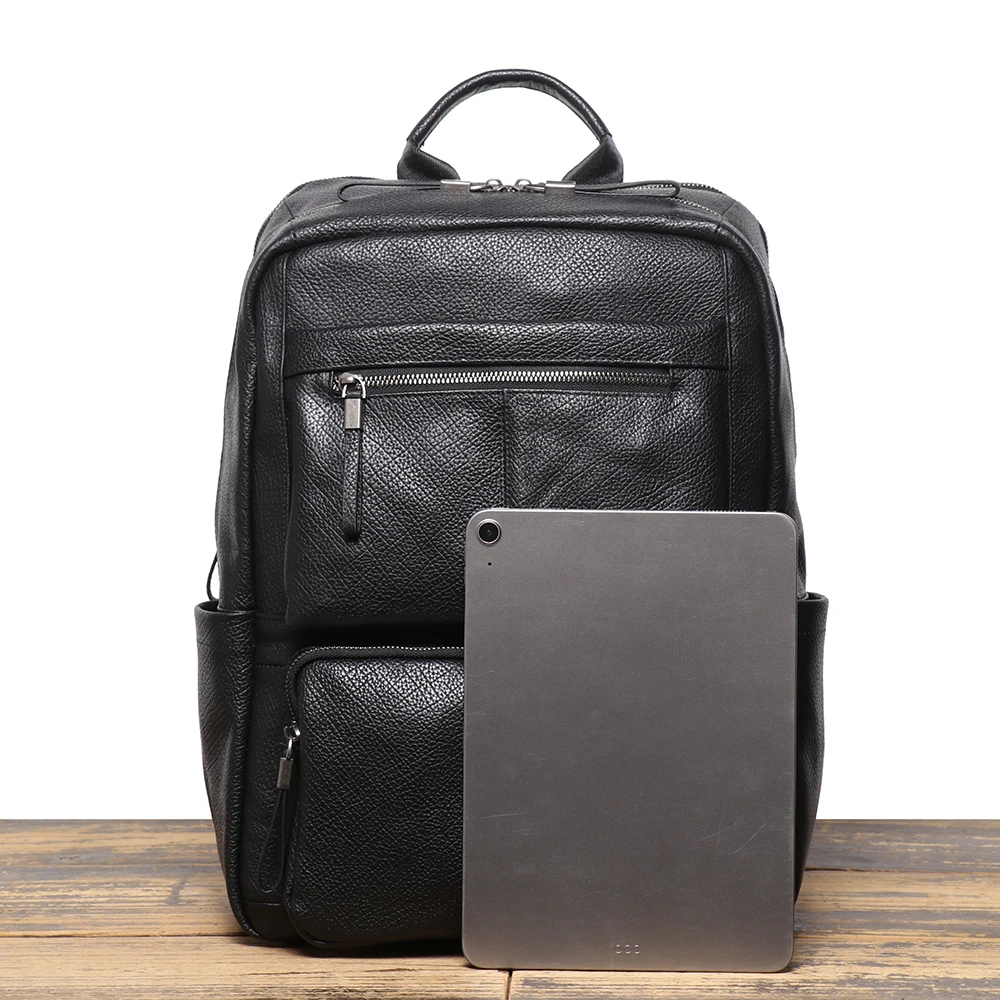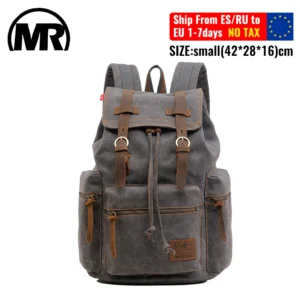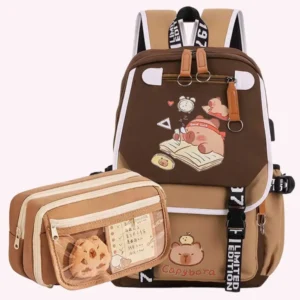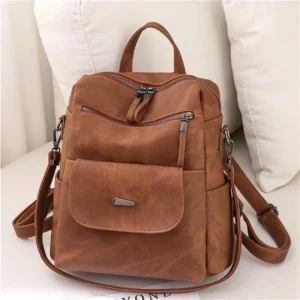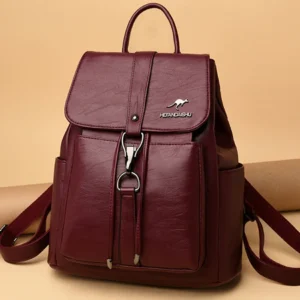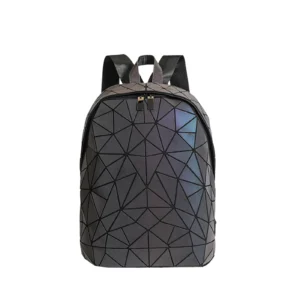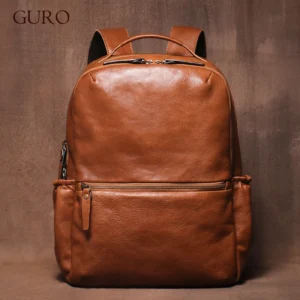Introduction: The Allure of Vintage-Style Leather Backpacks
There’s something undeniably captivating about a vintage-style leather backpack. More than just a fashion statement, these timeless accessories combine rugged durability with an aesthetic that speaks of adventures past and journeys yet to come. What separates a genuine vintage-style backpack from modern imitations goes far beyond mere appearances – it’s fundamentally about the materials used in their creation.
The careful selection of materials is what gives these backpacks their authentic character and remarkable longevity. When crafted from the right components, a vintage-style leather backpack isn’t just purchased; it’s invested in, becoming a companion that develops more character and charm with every passing year.
At its core, the vintage aesthetic relies on the harmonious combination of premium leathers, quality hardware, and complementary fabrics. These elements work together not just to create a certain look, but to ensure functionality that stands the test of time. Summit Carry’s approach honors traditional craftsmanship while incorporating thoughtful design for modern needs, resulting in vintage leather backpacks that are both nostalgic and relevant.
In this comprehensive guide, we’ll explore the essential materials that create truly exceptional vintage-style backpacks, from the foundation of premium leathers to the smallest hardware details that complete the experience.
Full-Grain Leather: The Gold Standard for Vintage Appeal
When it comes to creating authentic vintage-style backpacks, full-grain leather stands unchallenged as the premier material. Unlike other leather types, full-grain utilizes the outermost layer of the hide – the strongest, most durable portion with all its natural character intact.
The Beauty of Imperfection
What makes full-grain leather special is what many manufacturers try to remove – the natural marks, subtle variations in color, and unique grain patterns that tell the story of the animal’s life. These “imperfections” aren’t flaws but rather signatures of authenticity. Each stretch mark, insect bite, or subtle variation in texture contributes to a backpack that is truly one-of-a-kind.
The Magic of Patina Development
Perhaps the most coveted quality of full-grain leather is its ability to develop a rich patina over time. This natural aging process transforms the leather from its initial appearance to something more nuanced and beautiful. Through exposure to sunlight, oils from your hands, and the general wear of daily use, full-grain leather darkens in high-contact areas, develops a soft sheen, and creates a visual depth that simply cannot be manufactured.
Unmatched Durability
Beyond its visual appeal, full-grain leather offers practical benefits that make it ideal for vintage-style backpacks. Its dense fiber structure provides natural resistance to moisture, stretching, and tearing. With proper care, full-grain leather backpacks can last for decades – often becoming stronger and more supple with use rather than wearing out.
Summit Carry selects only premium full-grain leather hides, carefully inspecting each for quality and character. The thickness is precisely calibrated – substantial enough to provide structure and durability, yet not so heavy as to be unwieldy.
Crazy Horse Leather: The Pre-Distressed Vintage Option
For those who desire the character of aged leather without waiting years for natural patina development, Crazy Horse leather offers an appealing alternative. This special variety begins with high-quality full-grain leather that undergoes a unique waxing and treatment process.
The Pull-Up Effect
What distinguishes Crazy Horse leather is its remarkable “pull-up” effect. When the leather is bent, scratched, or folded, the waxes and oils in the leather shift, creating lighter areas that contrast with the base color. This instantly produces a distressed, vintage appearance that many associate with well-loved leather goods.
The benefits of Crazy Horse leather for vintage-style backpacks include:
- Immediate vintage character without waiting for natural aging
- A rugged, lived-in appearance from the first day of use
- Natural camouflaging of new scratches and marks, which simply blend into the existing texture
- Less meticulous maintenance required, as minor scuffs enhance rather than detract from its appeal
- Rich color variations that create visual depth and interest
Understanding proper leather conditioning and waterproofing is particularly important for maintaining the unique characteristics of Crazy Horse leather. While this leather type is more forgiving of minor scratches, it still benefits from occasional conditioning to prevent drying and maintain its suppleness.
For those who appreciate the vintage aesthetic but don’t want to wait years to achieve it, Crazy Horse leather provides an authentic alternative that still offers the durability and quality of full-grain leather. The ultimate guide to conditioning leather backpacks provides specific techniques for preserving the unique characteristics of this material.
Vegetable-Tanned Leather: Traditional Craftsmanship
When discussing materials that embody authentic vintage style, vegetable-tanned leather deserves special recognition. This leather is created using one of humanity’s oldest tanning methods, dating back thousands of years, where natural tannins extracted from tree bark, leaves, and plant matter transform raw hides into durable, beautiful leather.
The Natural Process
Unlike modern chrome tanning (which uses chromium salts and can be completed in just a day), vegetable tanning is a patient craft that takes weeks to months. This slow, deliberate process results in leather with distinctive characteristics perfectly suited for vintage-style backpacks:
- A firm, structured feel that gradually softens and molds to the user
- The ability to develop a deep, rich patina that becomes increasingly beautiful with age
- Natural variations in color that deepen and mature over time
- A subtle, earthy aroma characteristic of traditionally crafted leather
Environmental Considerations
Beyond its aesthetic qualities, vegetable tanning represents a more environmentally conscious approach to leather production. The natural tannins are biodegradable, and the process avoids the heavy metals used in chrome tanning. For those concerned about the environmental impact of their purchases, this traditional method aligns well with sustainable values.
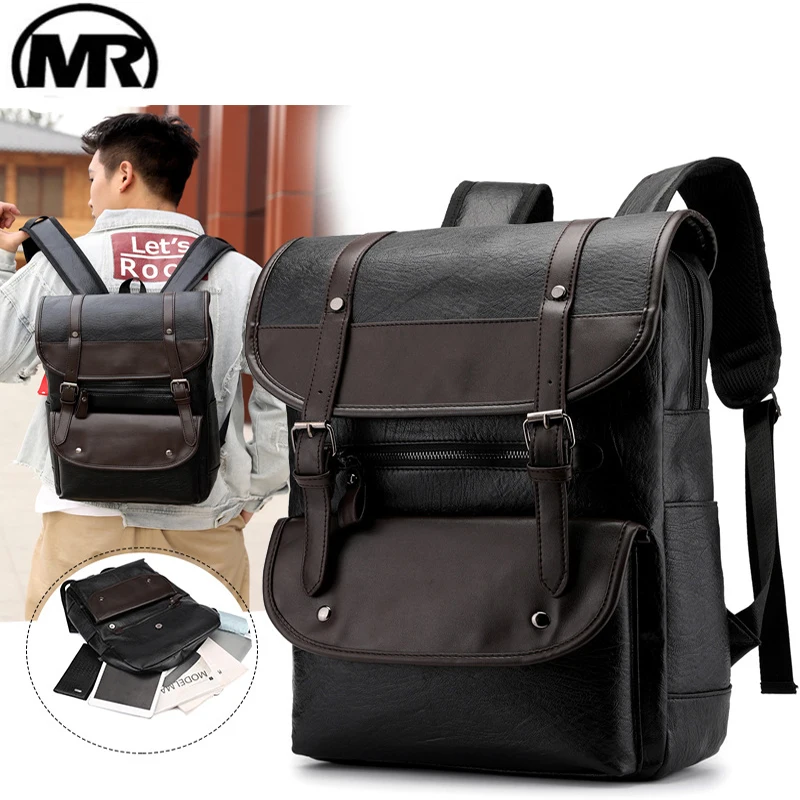
Vegetable-tanned leather does require some special care, particularly in its early life. It’s more susceptible to water spotting and environmental factors until it develops its protective patina. Learning the basics of waterproofing leather bags is especially important for preserving the beauty of vegetable-tanned leather items.
Summit Carry incorporates vegetable-tanned leather in designs where structure and traditional character are paramount, honoring the time-tested craftsmanship while ensuring the backpacks meet modern needs.
Other Leather Types Used in Vintage-Style Backpacks
While full-grain, Crazy Horse, and vegetable-tanned leathers are the premium choices for authentic vintage-style backpacks, several other leather varieties appear in the market, each offering different characteristics and price points.
Top-Grain Leather
After full-grain, top-grain leather represents the next quality tier. This leather has had its uppermost surface sanded to remove imperfections, then treated with a finish coat. For vintage-style backpacks, top-grain offers:
- A more uniform appearance than full-grain
- Greater softness and flexibility from the start
- Good durability, though not quite matching full-grain’s longevity
- A more consistent color and texture
While top-grain can develop some patina, it doesn’t achieve the same depth of character as full-grain leather. However, its smoother finish and lower price point make it popular for certain vintage and modern leather backpack features.
Distressed Leather
Some manufacturers artificially distress leather to create an immediate vintage appearance. This process might include:
- Mechanical abrasion to simulate wear patterns
- Chemical treatments that create color variations
- Tumbling with various objects to create natural-looking marks
Quality distressed leather can look convincingly aged, but it’s important to ensure the underlying leather quality is still high – artificial distressing on poor-quality leather merely disguises its deficiencies rather than enhancing its character.
Oil-Tanned Leather
Oil-tanned leather undergoes a specialized process where oils and waxes are infused during tanning. This creates leather with:
- Enhanced water resistance
- A supple, flexible feel from the beginning
- Rich, deep color with subtle variations
- Good durability in varied conditions
Materials to Avoid
When seeking authentic vintage-style leather backpacks, certain materials should be approached with caution:
- Genuine Leather: Despite its name, this is actually a lower grade, constructed from leftover leather scraps bonded together
- Bonded Leather: Similar to particle board, this material consists of leather fibers glued together and won’t develop the patina or longevity associated with vintage styles
- PU (Polyurethane) Leather: A synthetic material that mimics leather’s appearance but lacks its developmental character and typically deteriorates rather than improves with age
Waxed Canvas: The Perfect Leather Companion
While leather often takes center stage in vintage-style backpacks, waxed canvas deserves recognition as an excellent complementary material with its own rich heritage and distinctive character.
Originating in the sailing industry where fishermen would apply linseed oil to their sails for waterproofing, waxed canvas evolved into a durable, weather-resistant fabric that became standard for outdoor gear long before synthetic materials existed. Today, it remains prized for both its functional properties and its ability to develop character over time.
Modern waxed canvas typically consists of cotton canvas impregnated with a mixture of waxes and oils. This treatment creates a material that:
- Repels water while maintaining breathability
- Develops unique creasing and wear patterns over time
- Provides durability without excessive weight
- Complements leather’s aesthetic while adding textural contrast
The combination of leather and waxed canvas creates a harmony of materials that age beautifully together. Where leather develops a sheen and darkens, waxed canvas softens and creates distinctive wear patterns that reflect its use. This pairing is particularly effective in leather rucksacks where the canvas may form the body while leather reinforces stress points and creates structural elements.
Waxed canvas typically comes in earthy, muted colors that pair naturally with leather tones – olive greens, navy blues, rich browns, and classic tans. The material’s weight, measured in ounces (12-16oz being common for durable backpacks), indicates its thickness and durability.
Summit Carry selects premium waxed canvas that balances substantial weight for longevity with appropriate flexibility for comfort and practical use.
Essential Hardware for Authentic Vintage Character
While leather and fabric form the body of vintage-style backpacks, it’s the hardware that often provides both functional integrity and defining aesthetic touches. The choice of metal components significantly influences both the backpack’s appearance and its longevity.
Brass: The Timeless Choice
Solid brass hardware represents the gold standard for authentic vintage-style backpacks for several compelling reasons:
- Develops a beautiful patina that complements aging leather
- Offers exceptional strength and durability
- Provides natural corrosion resistance without plating
- Creates a warm, rich color contrast against leather
- Makes a subtle statement through its weight and substantiality
Genuine brass hardware pairs particularly well with brown leather backpacks, creating a classic combination that has remained relevant for generations.
Antique Finishes
Beyond natural brass, hardware with antique finishes helps enhance the vintage aesthetic:
- Antique brass: Darkened to simulate aged brass without waiting for natural patina
- Aged copper: Provides distinctive reddish tones with dark highlights
- Antique nickel: Offers a subdued silver tone that complements cooler leather shades
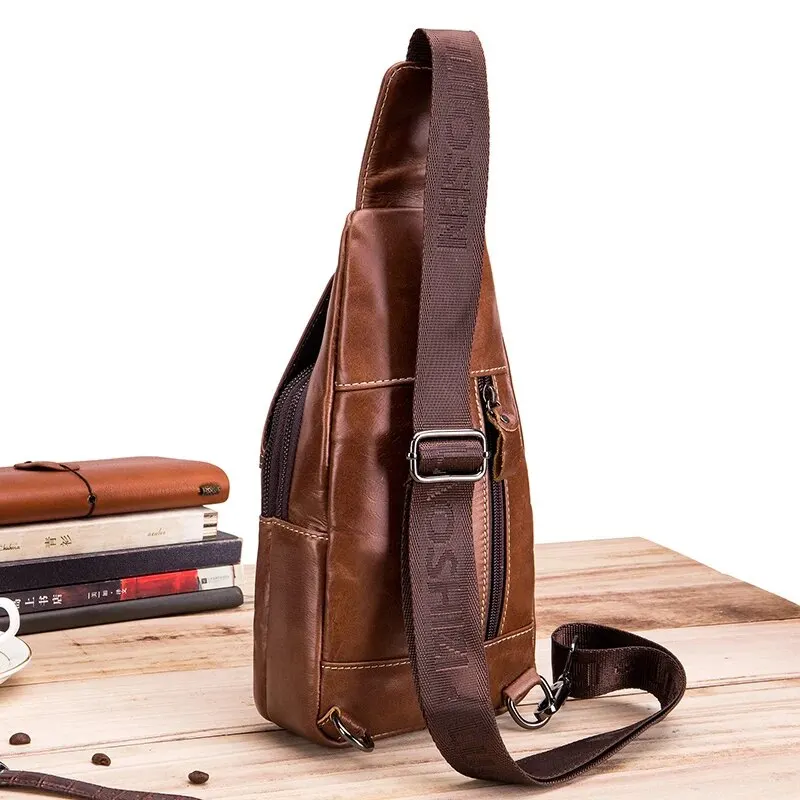
Key Hardware Components
The specific hardware elements that contribute to vintage character include:
Buckles: Traditional roller buckles, military-inspired designs, and decorative clasps add both functionality and visual interest. Quality buckles should have substantial weight and smooth operation.
Rivets: These small but critical components reinforce stress points while adding distinctive metallic details. Properly set rivets should be solid and flush, with even mushrooming on the back side indicating quality application.
D-rings and O-rings: These attachment points serve practical purposes while contributing to the overall aesthetic. Thick, cast rings with subtle texturing often indicate quality construction.
Zippers: Though not traditionally found on the earliest backpack designs, modern vintage-style packs often incorporate zippers for security and convenience. Brass or antique-finished metal zippers with leather pulls maintain the vintage aesthetic while adding functionality.
Summit Carry selects hardware not just for appearance but for performance, ensuring each metal component meets strict standards for strength, finish quality, and long-term durability. This attention to detail prevents the common failure points that plague lesser backpacks, such as strap detachments or broken closure mechanisms.
Interior Materials: Balancing Tradition with Function
While the exterior materials of vintage-style backpacks typically receive the most attention, the interior components play a crucial role in both functionality and longevity. The selection of lining materials reflects a balance between traditional authenticity and practical performance.
Traditional Lining Choices
Historically, vintage backpacks featured simple but effective interior materials:
- Heavy cotton canvas: Uncoated and natural, providing durability without added weight
- Cotton twill: Offering a diagonal weave pattern that combines strength with a smooth feel
- Herringbone cotton: Creating visual interest while maintaining material authenticity
These natural fabric linings develop their own character over time, softening and sometimes taking on subtle coloration from the items they carry. The evolution of vintage leather backpacks shows how interior materials have adapted to changing needs while maintaining their essential character.
Modern Alternatives for Enhanced Function
Contemporary vintage-style backpacks often incorporate modern materials that preserve the traditional aesthetic while adding practical benefits:
- Water-resistant cotton blends that maintain a natural feel while offering better protection
- Densely woven synthetics with a matte finish that resist wear while remaining visually unobtrusive
- Specialized pocket linings in contrasting colors to improve visibility of contents
Finding the Right Balance
The ideal interior for a vintage-style backpack achieves several objectives simultaneously:
- Protects carried items from leather oils and environmental factors
- Remains durable against the friction of daily use
- Complements the exterior aesthetic if visible when the bag is open
- Facilitates organization without excessive compartmentalization
- Allows for easy location of contents
Summit Carry approaches interior design with the same attention to detail as exterior components. The result is backpacks that honor traditional aesthetics while providing thoughtful organization for modern essentials like laptops, tablets, and everyday carry items.
Stitching and Construction: The Hidden Heroes
While materials receive much of the attention in discussions of vintage-style backpacks, the methods used to join those materials are equally crucial to both aesthetic appeal and longevity. Proper stitching and construction techniques are the unsung heroes that determine whether a backpack merely looks vintage or truly embodies the durability associated with traditional craftsmanship.
Thread Selection and Quality
The thread used in premium vintage-style backpacks is selected for specific performance characteristics:
- Bonded nylon thread: Offers exceptional tensile strength and resistance to abrasion
- Waxed thread: Provides water resistance and a traditional appearance, particularly appropriate for visible stitching
- UV-resistant treatments: Prevent deterioration from sun exposure, particularly important for thread used on exterior seams
Thread thickness is carefully matched to the materials being joined, with heavier threads for stress points and structural seams. Quality construction in men’s leather backpacks is evident in the consistency and precision of stitching throughout the bag.
Critical Construction Elements
Several construction techniques distinguish exceptional vintage-style backpacks:
- Reinforced stress points: Additional stitching, rivets, or leather patches at corners and strap attachments
- Box stitching or X-pattern reinforcement: Creates multiple anchor points where straps meet the body
- Rolled edges: Leather edges that are folded and stitched rather than left raw, improving both appearance and durability
- Saddle stitching: A traditional hand-stitching method that creates a lockstitch pattern resistant to unraveling, even if one portion becomes damaged
The Hand vs. Machine Balance
While machine stitching provides consistent strength for structural elements, many premium vintage-style backpacks incorporate hand-stitched components for both aesthetic appeal and functional benefits. Hand-stitching allows for greater tension control when joining materials of different thicknesses and provides a distinctive appearance that signals craftsmanship and attention to detail.
Summit Carry employs construction methods that allow for potential repair rather than replacement, honoring the tradition of creating goods meant to last for decades rather than seasons.
The Aging Process: How Materials Develop Character
The true magic of quality vintage-style backpacks lies not just in how they look when new, but in how they transform through use. Unlike modern synthetic materials that typically deteriorate with age, premium natural materials in well-crafted backpacks actually improve over time, developing a rich character that can’t be manufactured.
The Poetry of Patina
Patina – that magical transformation that happens to leather and metal over years of use – is perhaps the most coveted characteristic of vintage-style backpacks. This process occurs through:
- Natural oils from hands transferring to the leather surface
- Exposure to sunlight causing subtle color shifts
- The polishing effect of the backpack rubbing against clothing
- Minor scratches and marks that blend together to create texture
- Environmental factors like humidity and temperature fluctuations
Unlike artificial distressing, true patina cannot be rushed or perfectly replicated. Each backpack develops its own unique character based on how it’s used, where it travels, and who carries it.
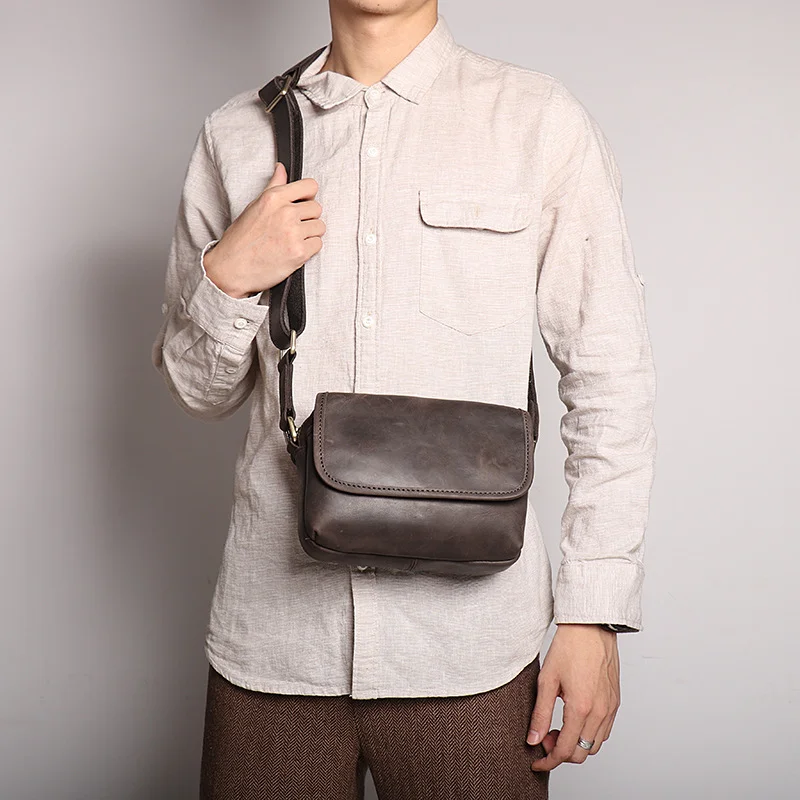
Material Harmony in Aging
When properly selected, the various materials in a vintage-style backpack age in harmony:
- Full-grain leather darkens and develops a rich sheen
- Brass hardware transitions from bright to a warm, muted tone
- Waxed canvas softens and creates distinct creasing patterns
- Stitching subtly recedes as it picks up minimal coloration
Understanding how to facilitate this aging process through proper DIY leather care for travel backpacks allows owners to guide their backpack’s evolution without damaging its integrity.
The Emotional Connection
Perhaps most importantly, this aging process creates a profound emotional connection between the owner and their backpack. Each mark tells a story – the scratch from that hiking trip, the slight darkening where it rests against your back, the softening of the handle from thousands of lifts. This narrative quality transforms the backpack from a mere possession into something closer to a companion, documenting life’s journey together.
Summit Carry designs with this aging process in mind, selecting materials and construction methods that ensure consistent and attractive development of character over many years of use.
What Makes Quality Materials Worth the Investment?
When confronted with the price difference between premium vintage-style leather backpacks and their lower-cost alternatives, many shoppers naturally question whether the investment is justified. Understanding the long-term value proposition of quality materials provides important context for this decision.
The False Economy of Lower Quality
While initially less expensive, lower-quality backpacks often follow a predictable pattern:
- Materials that look acceptable when new but quickly show wear
- Construction that fails at stress points, requiring repair or replacement
- Aesthetics that deteriorate rather than improve with age
- A shorter useful lifespan that leads to waste and additional purchases
In contrast, the investment in premium materials pays dividends over time:
- Increasing aesthetic appeal as patina develops
- Structural integrity that stands up to years of daily use
- Functionality that remains consistent or improves as materials conform to usage patterns
- A lifetime of service that makes the initial cost negligible when calculated per use
The Sustainability Factor
Beyond personal economics, there’s an environmental case for investing in quality materials:
- Reduced resource consumption through fewer replacement purchases
- Less waste generated over time
- Support for traditional craftsmanship and sustainable production methods
- Decreased carbon footprint compared to multiple cycles of production and disposal
Luxury leather backpacks made with premium materials exemplify this long-term approach to both value and sustainability, offering performance that improves rather than degrades through years of use.
14 Inch Leather Laptop Backpack, Brown Leather Backpack, Men's Leather Backpack, Vintage Leather Backpack
Price range: $177.28 through $199.12 Select options This product has multiple variants. The options may be chosen on the product page- Price range: $80.72 through $108.04 Select options This product has multiple variants. The options may be chosen on the product page
Brown Leather Backpack, Women's Leather Backpack
$112.16 Select options This product has multiple variants. The options may be chosen on the product pageLuxury Leather Backpack, Small Leather Backpack, Women's Leather Backpack
Price range: $137.48 through $138.28 Select options This product has multiple variants. The options may be chosen on the product pageDesigner Women's Backpack, Luxury Leather Backpack
Holographic Geometric Laser Diamond PU Leather Women’s Fashion Backpack with Glow-in-the-Dark Design$112.20 Select options This product has multiple variants. The options may be chosen on the product pageFull Grain Leather Backpack, Men's Leather Laptop Backpack, Men's Leather Work Backpack
$353.46 Select options This product has multiple variants. The options may be chosen on the product page
Beyond Functionality: The Experience Factor
Perhaps less tangible but equally important is how quality materials enhance the user experience:
- The pleasant texture of full-grain leather that becomes increasingly supple
- The satisfying weight and operation of solid brass hardware
- The visual richness that develops as materials age harmoniously
- The confidence that comes from knowing your backpack won’t fail when loaded with valuable items
Summit Carry’s material selection philosophy centers on this long-term perspective, prioritizing materials that not only perform exceptionally today but continue to improve through decades of use.
Care and Maintenance for Longevity
Even the finest materials require proper care to reach their full potential. Understanding basic maintenance routines can significantly extend the life of your vintage-style backpack while enhancing its natural aging process.
Leather Care Fundamentals
Different leather types have specific care requirements, but some principles apply universally:
- Regular dusting and gentle cleaning with a slightly damp cloth
- Allowing wet leather to dry naturally, away from direct heat sources
- Conditioning to replace natural oils, particularly after exposure to rain or dry conditions
- Storing in breathable covers rather than plastic when not in use for extended periods
Many owners wonder does oiling leather waterproof their backpacks. While conditioning oils improve water resistance by maintaining the leather’s natural properties, they don’t provide complete waterproofing. For enhanced protection, specific leather waterproofing products are more effective.
Waxed Canvas Maintenance
Waxed canvas requires different but equally straightforward care:
- Brushing rather than washing to remove surface dirt
- Spot cleaning with cold water and mild soap when necessary
- Re-waxing worn areas every 1-2 years depending on use
- Avoiding machine washing or dry cleaning, which can remove the protective wax
Hardware Upkeep
Metal components benefit from occasional attention:
- Wiping with a soft cloth to remove tarnish (though many prefer the natural patina)
- Applying a small amount of mineral oil to hinges or moving parts if they begin to stick
- Checking and tightening any screwed components
Preventative Care
Beyond reactive maintenance, preventative measures extend backpack life:
- Avoiding overloading beyond designed capacity
- Rotating use with other bags to allow leather to rest and regain shape
- Using protective treatments before exposure to harsh conditions
- Addressing minor damage promptly before it can spread
With proper care, the materials in a quality vintage-style backpack will continue to serve faithfully while developing the character and patina that make these items so desirable.
How to Identify Quality Materials When Shopping
With the growing popularity of vintage-style leather backpacks, the market has become flooded with options ranging from genuine heirloom-quality pieces to convincing imitations. Developing the ability to identify quality materials helps ensure your investment delivers the longevity and character you expect.
Leather Quality Indicators
When evaluating leather quality, look for these telltale signs:
- Natural variations in color and texture indicating full-grain leather
- A rich, natural smell rather than strong chemical odors
- Visible pores and follicle patterns on unfinished sides
- Edges that show consistent density throughout the thickness
- Suppleness that allows the leather to fold without cracking
- Thickness appropriate for the backpack’s structure and intended use
The ultimate guide to durable leather backpacks provides additional details on identifying leather that will stand the test of time.
Hardware Assessment
Quality hardware reveals itself through:
- Substantial weight that suggests solid metal rather than hollow construction
- Clean casting with well-defined details
- Smooth operation of moving parts like buckles and clasps
- Consistent finish without spotty application
- Properly set rivets with even mushrooming on the reverse side
Construction Evaluation
Beyond materials, construction quality indicates overall backpack longevity:
- Even, tight stitching with no loose threads
- Reinforcement at stress points like strap attachments
- Alignment of patterns if multiple pieces are joined
- Clean, finished edges rather than raw cuts
- Lining properly attached without bunching or gaps
Red Flags to Watch For
Be wary of these warning signs that may indicate inferior materials:
- Perfect uniformity in color and texture throughout all leather pieces
- Plastic-like feel or extremely stiff leather that doesn’t yield to pressure
- Strong chemical smells that don’t dissipate after airing
- Edges that appear layered or fibrous rather than solid
- Hardware that feels lightweight or has rough edges
- Descriptions that avoid specific leather terminology or use ambiguous terms
Summit Carry’s commitment to quality materials is evident in the details of construction, the substantial feel of the leather, and the smooth operation of all hardware components.
The Environmental Impact of Material Choices
As consumers become increasingly conscious of sustainability issues, understanding the environmental implications of material choices becomes an important part of the purchasing decision for vintage-style backpacks.
The Sustainability Spectrum of Leather Production
Different leather tanning methods create significantly different environmental footprints:
- Vegetable tanning uses natural plant materials and creates biodegradable leather, though it requires more time and water than industrial processes
- Chrome tanning is faster and less expensive but uses chromium compounds that require careful management to prevent environmental contamination
- Combination tanning methods attempt to balance the benefits of both approaches with varying degrees of success
The Longevity Factor
Perhaps the most significant environmental benefit of quality materials comes from their extended lifespan:
- A premium leather backpack might last 20+ years compared to 1-2 years for synthetic alternatives
- This longevity reduces the resources required for manufacturing replacements
- Quality items are more likely to be repaired rather than discarded when damaged
- When eventually retired, natural materials biodegrade more readily than synthetics
Ethical Sourcing Considerations
Beyond production methods, the sourcing of materials impacts their environmental footprint:
- Leather as a by-product of food production utilizes materials that might otherwise be wasted
- Responsible tanneries implement water recycling and waste management practices
- Small-batch production often creates less waste than mass manufacturing
- Traditional craftsmanship typically emphasizes repair and longevity over planned obsolescence
Summit Carry approaches environmental responsibility through material selection focused on longevity, ethical sourcing partnerships, and designs intended to remain relevant beyond short-term fashion cycles. By creating backpacks meant to last for decades rather than seasons, the environmental impact per use is dramatically reduced compared to frequently replaced alternatives.
The true sustainability of a vintage-style leather backpack lies not just in its initial production, but in its ability to remain functional and desirable through years of daily use – becoming not just a purchase, but a lasting companion on life’s journey.
